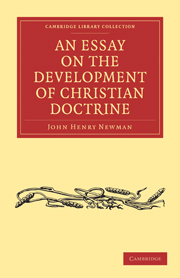Book contents
- Frontmatter
- ADVERTISEMENT
- Contents
- INTRODUCTION
- CHAPTER I ON THE DEVELOPMENT OF IDEAS
- CHAPTER II ON THE DEVELOPMENT OF CHRISTIAN IDEAS, ANTECEDENTLY CONSIDERED
- CHAPTER 3 ON THE NATURE OF THE ARGUMENT IN BEHALF OF THE EXISTING DEVELOPMENTS OF CHRISTIANITY
- CHAPTER IV ILLUSTRATIONS OF THE ARGUMENT IN BEHALF OF THE EXISTING DEVELOPMENTS OF CHRISTIANITY
- CHAPTER V ILLUSTRATIONS CONTINUED
- CHAPTER VI ILLUSTRATIONS CONTINUED
- CHAPTER VII ILLUSTRATIONS CONTINUED
- CHAPTER VIII ILLUSTRATIONS CONCLUDED
CHAPTER I - ON THE DEVELOPMENT OF IDEAS
Published online by Cambridge University Press: 16 May 2011
- Frontmatter
- ADVERTISEMENT
- Contents
- INTRODUCTION
- CHAPTER I ON THE DEVELOPMENT OF IDEAS
- CHAPTER II ON THE DEVELOPMENT OF CHRISTIAN IDEAS, ANTECEDENTLY CONSIDERED
- CHAPTER 3 ON THE NATURE OF THE ARGUMENT IN BEHALF OF THE EXISTING DEVELOPMENTS OF CHRISTIANITY
- CHAPTER IV ILLUSTRATIONS OF THE ARGUMENT IN BEHALF OF THE EXISTING DEVELOPMENTS OF CHRISTIANITY
- CHAPTER V ILLUSTRATIONS CONTINUED
- CHAPTER VI ILLUSTRATIONS CONTINUED
- CHAPTER VII ILLUSTRATIONS CONTINUED
- CHAPTER VIII ILLUSTRATIONS CONCLUDED
Summary
ON THE PROCESS OF DEVELOPMENT IN IDEAS.
It is a characteristic of our minds to be ever engaged in passing judgments on the things which come before them. No sooner do we learn, but we judge; we allow nothing to stand by itself: we compare, contrast, abstract, generalize, adjust, classify; and we view all our knowledge in the associations with which these processes have invested it.
Of the judgments thus exercised, some are mere opinions, which come and go, or remain with us only till an accident displaces them, whatever influence they may exert meanwhile. Others are firmly fixed in our minds and have a hold over us, whether they are principles of conduct, or are views of life and the world, or fall under the general head of belief. These habitual judgments often go by the name of ideas, and shall be called so here.
Of these ideas,–religious, political, or otherwise relating to human affairs,–some are real, that is, represent facts existing; and others are mere imaginations, and stand for nothing external to themselves. Thus the heathen mythology, or the Cartesian system of vortices, supplied a variety of ideas, which were but fanciful and unreal; whereas the idea of a saint, or a hero, or a tyrant, or what are called the laws of motion, are the representatives of things.
Ideas thus described, being of the nature of judgments, must, properly speaking, be considered as true by those who hold them.
- Type
- Chapter
- Information
- An Essay on the Development of Christian Doctrine , pp. 30 - 93Publisher: Cambridge University PressPrint publication year: 2010First published in: 1845



